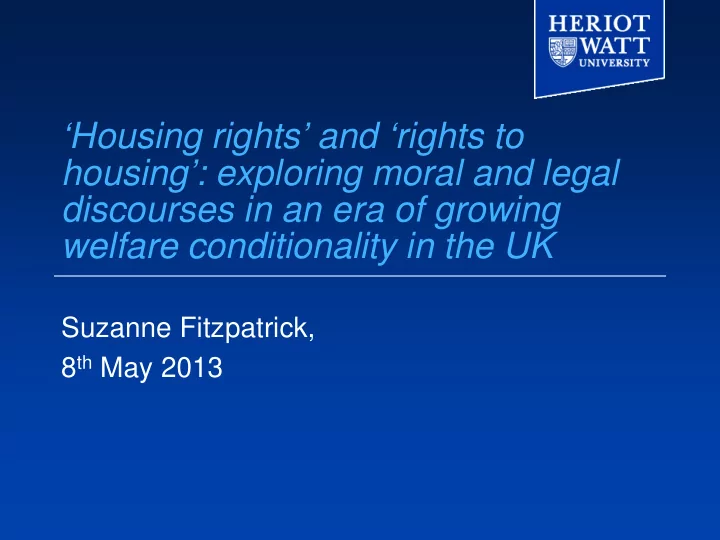

‘Housing rights’ and ‘rights to housing’: exploring moral and legal discourses in an era of growing welfare conditionality in the UK Suzanne Fitzpatrick, 8 th May 2013
Introduction Rights – moral and legal; global and national Welfare rights, welfare reform and conditionality ‘Housing rights’ and ‘rights to housing’
The triumph of juridification? Growing clamour for fundamental rights , including social and economic rights, in legal as well as social policy scholarship Vocal demands for a ‘ rights-based approach t o tackling homelessness ’ – Europe (FEANTSA), US, Canada Intuitively appealing – but what precisely do those invoking such rights actually mean? That there is such a right or that there ought to be such a right? Distinction between moral and legal rights – at both global realm and national levels
The global realm Natural rights and human rights – international instruments, e.g. UN, EU, Council of Europe Moral statements about human beings – they ought to have access to these rights, including the right to housing But are these abstract moral rights: …self-evident or a mere rhetorical device ( ‘ rights are trumps! ’ )? What is the foundation of their protected status? …meaningful without enforceability ( ‘nonsense on stilts! ’)? …if enforceable, then undemocratic? – do we want unelected judges determining the allocation of scarce resources?
The national realm The ‘ social rights ’ of citizenship – substantive entitlement to (welfare) goods and services, including housing Programmatic rights – the ‘ right to housing ’ often in European constitutions; a ‘ political marker of concern ’ Legal rights – enforceable in court/tribunals; rare to have a legal entitlement to housing, somewhat more common with other welfare goods (especially cash transfers)
Welfare rights and conditionality Legal rights to welfare (both ‘universal’ and ‘selective’) are always conditional ; entitlement is predicated on eligibility Eligibility based on: ‘club membership’ (citizenship, contribution records); ‘status’ (age, health, disability); means-testing (income, assets) What is new is the intensification of conduct-related conditionality linked to personalised behavioural requirements
ESRC study on ‘Welfare Conditionality’ Five year study; 5 UK universities The efficacy (does it in fact bring about the behaviour change sought) and the ethicality (from a range of normative perspectives) of intensifying conduct conditionality in UK welfare Linking developments in housing to those in social security , criminal justice and migration Six case study cities, in England (n=4) and Scotland (n=2) QLR with 8 panels of 60 welfare recipients subject to conditionality (n=480 x 3 waves of interview)
‘Housing rights’ and ‘rights to housing’ ‘Housing rights’ - rights to protect, e.g. security of tenure, unlawful eviction, excessive rent increases, etc. ‘Rights to housing’ - rights to fulfill, e.g. to provide housing for those who lack it Both types of housing-related rights are subject to increased conditionality in the UK, and focused upon in the ESRC study
‘Housing rights’ and conditionality Security of tenure - fixed-term tenancies are weakening the de jure housing security of social tenants in England Welfare reform (especially the bedroom tax and benefit caps) - weakening the de facto housing security of low-income households across the UK
‘Rights to housing’ and conditionality Enforceable rights to settled housing very unusual – UK and France only Radical divergence in homelessness entitlements across UK: in Scotland, abolition of ‘ priority need’ at end 2012; in England, compulsory discharge of duty into private rented sector In both jurisdictions = homeless applicants ‘responsibilised’ via housing options
Conclusion Maintain critical perspective on all ‘ rights talk ’ What precisely do we mean by a ‘ rights- based approach’? And does it deliver what we expect it to in practice? Examine housing and welfare conditionality through a range of normative ‘lenses’ – citizenship, human rights, social justice and utilitarianism
Publications Fitzpatrick, S. & Pawson, H. (2013) ‘Ending security of tenure for social renters: transitioning to ‘ambulance service’ social housing?’, Housing Studies (forthcoming) Fitzpatrick, S. & Pleace, N. (2012) ‘The statutory homelessness system in England: a fair and effective rights-based model?’, Housing Studies, 27(2): 232-251. Bengtsson, B., Fitzpatrick, S and Watts, B. (2011) ‘Shelter, rights and citizenship’, in S. Smith (Editor-in-Chief) International Encyclopedia of Housing and Home. Oxford: Elsevier. Fitzpatrick, S. & Watts, B. (2011) ‘The ‘Right to Housing’ for homeless people’, in E. O’Sullivan et al. (Eds), Homelessness Research in Europe. Brussels: FEANTSA.
Recommend
More recommend